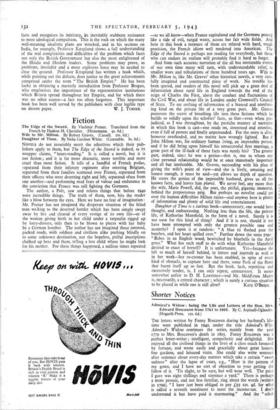Fiction
The Edge of the Sword. By Vladimir Pozner. Translated from the French by Haakon M. Chevalier. (Heinemann. 9s. 6d.) Wife to Mr. Milton. By Robert Graves. (Cassell. ma. 6d.)
Daughter of Time. By Nelia Gardner White. (Constable. Ss. 6d.) NovEts do not invariably merit the adjectives which their pub- lishers apply to them, but The Edge of the Sword is indeed, as its wrapper claims, ," heart-rending." It is called a novel, but it is not fiction ; and it is far more dramatic, more terrible and more cruel than most fiction. It tells of. a handful of French poilus, separated from their infantry regiment after entering Belgium, separated from their families scattered over France, separated from their officers who were deserting right and left, separated often from one another—and performing mad feats of valour and endurance in the conviction that France was, still fighting the Germans.
The author, a Pole, saw and relates things that before 1940 were incredible things. The truth of them, now, hits the reader like a blow between the eyes. Here we have no feat of imagination: Mr. Pozner has not imagined the desperate situation of the blind man walking to the deserted hamlet which has been simply swept away by fire and cleared of every vestige of its own life—or of the woman giving birth to her child under a tarpaulin rigged up by lorry-drivers, only then to be blown to pieces with her baby by a German bomber. The author has not imagined those jammed, packed roads, with soldiers and civilians alike pushing blindly on to some unknown destination, nor the hopeless, pitiful inscriptions chalked up here and there, telling a lost child where he might look for his mother. For these things happened, a million times repeated
—as we all know—when France capitulated and the Germans poured like a tide of evil, turgid water, across her fair wide fields.' And here in this book a measure of them are related with hard, tough precision, the French idiom well rendered into American. The Edge of the Sword is perhaps not reading for everybody, but those who can endure its realism will probably find it hard to forget.
And from such accurate narration of the all but intolerable events of our own time many will turn, with understandable relief, to smaller woes and tribulations of three hundred years ago. Wife to Mr. Milton is, like Mr. Graves' other historical novels, a very care- fully imagined and constructed piece of work. No trouble has been spared, and readers of this novel will pick up a great deal of iliformation about rural life in England towards the end of the reign of Charles the First, about the conduct and fluctuations of the Civil War, and about life in London under Cromwell's Council of State. To say nothing of information of a biassed and unrelent- ing kind on the private life of a very great poet. Mr. Graves possesses the secret of breathing life into .these fictions which he builds so solidly upon the scholars' facts, so that—even when pre- judiced, as I was throughout, by the pastiche manner of narrative in which this book is cast—one reads on, interested and attentive, even if full of protest and finally unpersuaded. For the story is alive, however overloaded, and no matter how wrongly lighted. But if John Milton was, for ordinary human :lying, an impossible person, and if he did bring upon himself his unsuccessful first marriage, a great part of the ill-luck of these facts was surely his? • The greater part, indeed, since he was a genius—that is, one to whom any close personal relationship would be at once immensely important and all but intolerable. Mr. Graves, succeeding with his plan of giving the wife's point of view—and she is lively, amusing and honest enough, it must be said—yet allows no depth of question. He states the genius of the impossible husband, gives us all the known facts, and leaves him plena. We never feel, any more than the wife, Marie Powell, did, the poet, the pitiful, gigantic immortal, behind the preposterous prig. But perhaps no novelist could get over the human difficulties Milton raises—and anyway here is plenty of information and plenty of solid life and entertainment.
Daughter of Time is a curious book—unnecessary, one would have thought, and embarrassing. Nothing less than the life, the private life, of Katherine Mansfield, in the form of a novel. Surely it is too soon for this kind. of thing? And if it is not, should it not have been attempted with only the greatest possible care and austerity? I open it at random: " A blue tit flashed past the beeches, and her heart spilled over." Further down the same page: "Babes in an English wood, bewitched by bluebells in the April grass." What has such stuff to do with what Katherine Mansfield desired to exact of herself? It is unfortunate. Yet—because she left so much of herself behind, in letters and journals as well as in her work—her re-creator has been enabled, in spite of every kind of obstacle, to capture here and there, some flash of the flame that burnt itself up so fast. But the book, lush, repetitive and excessively tender, is, I can only repeat, unnecessary. It seems somewhat unfair to D. H. Lawrence—and Mr. Middleton Murry is, necessarily, a central character ; which is surely a curious situation to be placed in while one is still alive? KATE O'BRIEN.


























 Previous page
Previous page